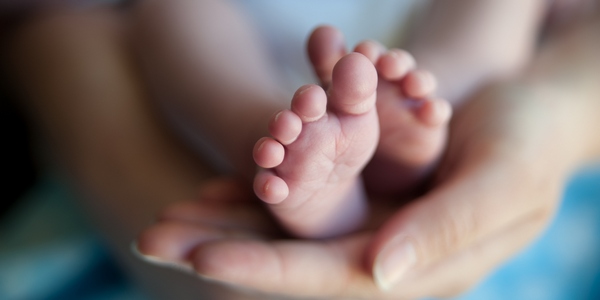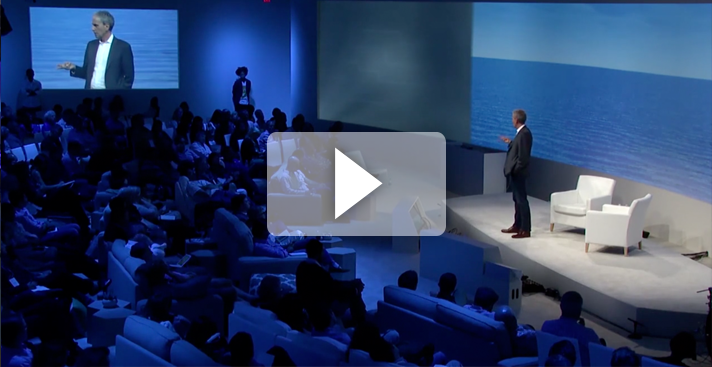Stress, pregnancy and the likelihood of giving natural birth

Dr. Guy-Paul Gagné is a medical doctor with 30 years of experience in the practice of obstetrics and gynecology. He is a Fellow of the Royal College of Surgeons of Canada.

We asked the doctor’s advice on such important issues as how to give natural birth and create the best possible environment for maternal care.
Increased stress means to more interventions
Dr. Gagné, what are the most important issues for you in your work as a doctor, educator and researcher?
Dr. Guy-Paul Gagné: I have devoted most of my career to improving maternity care. That is the passion of my life. There are some problems in this area. For instance, the rates of medical intervention during labor are on the rise. Women seem to have lost faith in their capacity to give birth with no or minimal intervention.
Modern medicine is based on good intentions: we want to save lives and intervene only when needed. However, in the past 20 years modern medical maternity care has gone somewhat overboard – doing too many interventions that sometimes probably create problems instead of solving them.
We need ways to approach this complicated problem. Women need to regain their confidence in their capacity to give birth in a natural and comfortable way. Technology is sometimes useful but it should not be abused. It is not only a question of the mother’s belief in her capacity to give natural birth. The values and beliefs of physicians and health care professionals are equally significant.
 What do you think could be the reason behind the rising rates of interventions?
What do you think could be the reason behind the rising rates of interventions?
Dr. Guy-Paul Gagné: A few years ago researchers in the United States compared two groups of mothers – those who had delivered their babies 50 years ago with those who had done so more recently. There was a stark difference between the two groups. Labor and birth today are 2-3 hours longer, and the number of medical interventions is four times higher.
At first the medical experts sought to explain these results through certain changes in the population – babies have become bigger, mothers are increasingly overweight, women give birth at an older age, and so on. But even after correcting for these variables, they could not account for all the differences.
So the most likely underlying cause here is the increased stress of modern life. For example, in the last 50 years, mothers have massively entered the workforce – and although this is undoubtedly a step in the right direction, it also creates tension and strain that may require some adjustments in order to favor better reproductive health. The stress felt by women has made labor and birth longer and more difficult, and it has produced a corresponding fear of childbirth in the medical community and in the general population. There’s now a general belief that birth is hard and dangerous, and that it requires medical intervention most of the time.
What impact does stress have on the expecting mother?
Dr. Guy-Paul Gagné: We know from modern research that mother and baby should be considered as one unit during pregnancy, and even for a while after birth. Anything we do to one or the other will necessarily affect both of them.
 Maternal stress during pregnancy is damaging to both mother and baby. It can lead to premature births, small-for-date births, longer labor, and more difficult and painful labor, thereby increasing the risk of needing medical interventions. It will also affect the cognitive, behavioral, and emotional development of the child. Cortisol – the stress hormone – is toxic to the baby’s brain.
Maternal stress during pregnancy is damaging to both mother and baby. It can lead to premature births, small-for-date births, longer labor, and more difficult and painful labor, thereby increasing the risk of needing medical interventions. It will also affect the cognitive, behavioral, and emotional development of the child. Cortisol – the stress hormone – is toxic to the baby’s brain.
Meditation, a great way to deal with stress
So reducing the stress levels of expecting mothers is crucial. Which measures should then be taken to combat the harmful effects of stress on both mother and baby?
Dr. Guy-Paul Gagné: Hospitals and birthing centers should adopt methods and policies that leave the mother in control of the process in a quiet, comfortable, and private environment where technology and drugs are used only to address real problems, never routinely. Giving birth is a very delicate and intimate process. The hormones involved are the same as during lovemaking, so this is why it should remain undisturbed and unobserved as much as possible.
But we cannot always control everything that is going on outside in the environment. For example, we could say that mothers ideally should not be working during pregnancy in order to take maximum rest and that they should find the best midwife, doctor and birthing center, but this is not always possible. Even under the best of circumstances, life is always somewhat unpredictable. The best way to deal with stress is from inside. That means: teach your body not to react negatively to stressful situations. Learn how to preserve inner silence in spite of outer noise!
As a physician, I want to recommend to my patients only technologies and treatments that are scientifically proven. Over the years I became interested in the scientific research on Transcendental Meditation (TM). I had my first positive experience with Transcendental Meditation with my own family, and relying on the scientific evidence I started gradually recommending it to my patients as well. I have had very good results.
Those few hundred of my patients who were practicing TM during pregnancy had, as a rule, easier pregnancies, their labor was shorter, and they needed fewer interventions. In fact, I don’t recall having to do a caesarean section (for failure to progress in labor) on any of my patients who practiced the TM technique…
What are the scientific findings that have prompted you to recommend this technique to your patients?
Dr. Guy-Paul Gagné: We know from scientific studies that the Transcendental Meditation techniquereduces the cortisol level in the bloodstream and creates a deep level of rest – that is very soothing for both mother and baby during pregnancy and labor. It’s not that you practice it during labor. The technique, when practiced regularly, produces this inner silence which stays with you even after the practice session is ended. This silence tends to increase the confidence of the mother. Stress creates fear and fear disturbs the process of labor. TM practitioners tend to stay calmer and thus everything goes better.

We also know from neuroscience that stress promotes fragmented brain function – the brain starts to work in patches, responding to the most pressing emergency. This fight or flight reaction was designed by nature to allow us to quickly escape from danger. If it’s chronic, then the brain gets habituated to working in this fragmented way.
TM meditation, on the other hand, promotes brain integration, the capacity of the brain to work as a whole. It’s the difference between getting caught in a detail and forgetting all the rest or being able to see the whole picture while engaging in a particular activity. It brings back the confidence, the capacity to deal with life as it rises in this moment.
It is important for everyone to be able to deal with the ups and downs without damaging his or her physiology, but for a pregnant woman this is a whole new level of responsibility. Having a child is producing the next generation; it is the ultimate act of love; it is the gift of life. It cannot be done lightly.
Before brain imaging came about we did not know that the future of a child is decided very early, even before birth, and that the state of mind of the mother directly influences the child’s state of mind long after birth. It’s a great responsibility that parents have – to want to give your child the ability to reach their full potential. The research on the impact of TM on brain physiology and stress hormone production is so comprehensive that we can readily apply it.
 Take care of stress, and a happy, natural birth will follow!
Take care of stress, and a happy, natural birth will follow!
So each expecting mother should take charge and improve the situation herself?
Dr. Guy-Paul Gagné: The expecting parents can certainly make choices, and there are a number of things they could do.
It’s important to work on oneself already before giving birth – to gain confidence and have a feeling of safety, to have good support. Of all the scientifically researched stress management techniques to use before,during and after pregnancy, I would say that TM is by far the best one.
The physical environment is important, too. While giving birth, can the mother be accompanied by her husband and/or a doula? Will she be able to keep the baby in skin-to-skin contact with her for the first two hours after birth and in the same room thereafter? Will there be enough privacy and intimacy? Will her choices be respected? Will she get proper support for breastfeeding, etc.?
Once more, it is all tied in to minimizing stress and increasing bonding with the baby.
It is very good to keep the stress hormone level nice and low. Yet we might not be able to control all external triggers of stress – the ambience of the room, whether the mother feels accompanied and supported, whether there is trust towards the institution – and so it all starts from within. This is why TM is so important. At the end of the day, it is how the mother’s brain responds to factors of stress that makes all the difference.
The main message from you as a doctor is then that if you keep stress under control, nature will take care of everything else?
Dr. Guy-Paul Gagné: Yes, that would be it. It’s the difference between having an integrated experience, a nice experience that flows naturally, or a disintegrated, fragmented one.
Dr. Guy-Paul Gagné: Nature has provided every woman with everything that she needs to be a mother. It’s a very wise and complete system of managing the contractions and the progress of labor, production of milk, and creating the state of euphoria in the mother even if the sensations of labor are intense, easing both the birth and the process of bonding – attachment and love – between the mother and the baby.
However, if you raise the stress hormone level too much, this process is disturbed. The orchestra of hormones which normally would take you through the experience in a pleasant way is kicked out of its balance. When the woman is not confident in her capacity to give birth comfortably and naturally, when she is not well prepared mentally, then stress and fear get in very quickly and soon we’ll be talking about the whole cascade of medical interventions.
What about fear of physical pain?
 Dr. Guy-Paul Gagné: This is an important topic because poor understanding of the nature of pain has given rise to a lot of fear and mismanagement of pain during labor. According to the scientific literature, pain has two components – the objective, physiological aspect called the sensory discriminative aspect that can be objectively measured, and the motivational-affective aspect of pain which represents the unpleasantness, the stress and the suffering felt subjectively.
Dr. Guy-Paul Gagné: This is an important topic because poor understanding of the nature of pain has given rise to a lot of fear and mismanagement of pain during labor. According to the scientific literature, pain has two components – the objective, physiological aspect called the sensory discriminative aspect that can be objectively measured, and the motivational-affective aspect of pain which represents the unpleasantness, the stress and the suffering felt subjectively.
Now, what is interesting is that the latter is not directly proportional to the physical amount of pain. It rather depends on one’s mental state, and can thus be modified and greatly reduced by TM. There’s a study showing that after only 3 months of practice, meditation practitioners were having a 50% reduction in their affective interpretation of an acute objective pain signal.
So, in the context of giving birth, the physical sensation can be very intense, but it depends on how the brain metabolizes it whether it sets you to suffering and fear or stays at a sometimes very intense but yet tolerable sensation! We did a meta-analysis on the use of non-drug pain management during labor and were able to show that if we first take care of the affective aspect of the pain, we greatly improve the outcome. The labor is shortened, there is higher level of satisfaction, there is up to 60% reduction in caesarean sections, 21% more likelihood of avoiding forceps or vacuum. The health of the baby – as indexed by Apgar scores – is also better. Negative experience of birth is reduced by a factor of two?; breastfeeding failure reduced by half; and so on…
So far the medical community has been focusing primarily on taking care of the objective aspect of pain with the almost routine use of narcotics and epidural analgesia. However, despite their apparent efficacy, none of these techniques are without side effects, and they often trigger the need for other interventions. We have found that the best results in term of the quality and safety of the childbirth experience are obtained when the affective aspect of the birth experience is addressed first and foremost.
In any case the mother should always be at the center and in control of her care so that she makes all the decisions. The problem with maternity care today is that most institutions, even if they claim to do so, in fact offer very few alternatives to drug intervention. This is mostly a consequence of the routine use of epidural that has gradually wiped out all other, more natural approaches. So it is increasingly the responsibility of the expectant parents to find a solution. The practice of TM during pregnancy, along with prenatal preparation and good accompaniment during labor, seems to be the best recipe for success.
It would be interesting to know how you first came across the Transcendental Meditation technique.
Dr. Guy-Paul Gagné: I was a young doctor in training during the late ’70s and beginning of the ’80s. Being trained as a gynecologist was at the time very demanding and stressful – I regularly had to stay up all night to attend deliveries and emergency surgery.
I saw an article in a scientific journal about Transcendental Meditation saying that the technique reduces cortisol levels and oxygen consumption, decreases stress, and provides deep rest that is even more effective than deep sleep! I said to myself, “That’s exactly what I need!” So, in short, I learned TM because I wanted to improve my performance as a physician.
I was really impressed with the results and have kept going since then.
What changes did you notice when you started practicing Transcendental Meditation?
Dr. Guy-Paul Gagné: I was immediately more effective in my work, which involves taking a lot of responsibility. Back then it was common for me to have to work most of the night on emergencies and then the whole day after that. As a result I was often sleep deprived. After starting TM, my thinking became much clearer. I could be more effective with less work! It gave me more energy and I was able to keep going for longer hours. Sometimes you cannot change your environment but have to adapt to it, and for me, meditation was a great tool for this. It gave me more and more creativity and I was able to find good opportunities to improve my personal and professional life.
I also believe that TM almost immediately gave me the ability to better appreciate the simple and natural things of life that are the basis of true happiness and satisfaction. So meditating really was “life-transforming,” right from the beginning.

Original article appeared on TMHome.com
Find out more about Transcendental Meditation
Follow us on Facebook
Follow us on Twitter







